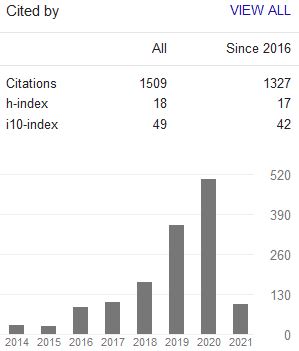CAMPUS-BASED MILLENNIALS’ LEARNING PREFERENCES TOWARD DA’WAH IN URBAN CITY OF SURABAYA
Abstract
Keywords
Full Text:
PDFReferences
Anam, Saeful. “Karakteristik Dan Sistem Pendidikan Islam: Mengenal Sejarah Pesantren, Surau Dan Meunasah Di Indonesia.†JALIE: Journal of Applied Linguistics and Islamic Education 1, no. 1 (2017): 146–167.
Bauman, Whitney, Joseph A. Marchal, Karline McLain, Maureen O’Connell, and Sara M. Patterson. “Teaching the Millennial Generation in the Religious and Theological Studies Classroom.†Teaching Theology and Religion 17, no. 4 (2014): 301–322.
Beutell, Nicholas J. “Generational Differences in Work-Family Conflict and Synergy.†International Journal of Environmental Research and Public Health 10, no. 6 (2013): 2544–2559.
Cennamo, Lucy, and Dianne Gardner. “Generational Differences in Work Values, Outcomes and Person Organization Values Fit.†Journal of Managerial Psychology 23, no. 8 (2008): 891–906.
Christodoulou, Eleni, and Athina Kalokairinou. “Net Generation’s Learning Styles in Nursing Education.†Studies in Health Technology and Informatics 213 (2015): 119–121.
Corey, Robert C. “Digital Immigrants Teaching Digital Natives: A Phenomenological Study of Higher Education Faculty Perspectives on Technology Integration with English Core Content.†Drake University, 2012.
Dacholfany, M. Ihsan. “Reformasi Pendidikan Islam Dalam Menghadapi Era Globalisasi: Sebuah Tantangan Dan Harapan.†Akademika 20, no. 1 (2015): 173–194.
Djiwandono, Patrisius Istiarto. “The Learning Styles of Millennial Generation in University: A Study in Indonesian Context.†International Journal of Education 10, no. 1 (2017): 12–19.
Hidayat, Z, Asep Saefudin, and Sumartono Sumartono. “Motivation, Critical Thinking and Academic Verification of High School Students’ Information-Seeking Behavior.†Record and Library Journal 3, no. 1 (2017): 10–24.
Hosen, Nadirsyah. “Online Fatwa in Indonesia: From Fatwa Shopping to Googling a Kiai.†In Expressing Islam: Religious Life and Politics in Indonesia, edited by Greg Fealy and Sally White, 162. Singapore: Institute of Southeast Asian Studies, 2008.
Lower, Judith. “Brace Yourself: Here Comes Generation Y.†Critical Care Nurse 28, no. 5 (2007): 80–85.
Mas’ud, Ali, Ah Zaki Fuad, and Ahmad Zaini. “Evolution and Orientation of Islamic Education in Indonesia and Malaysia.†Journal of Indonesian Islam 13, no. 1 (2019): 21–49.
Nuriman, and Fauzan. “The Influence of Islamic Moral Values on the Students’ Behavior in Aceh.†Dinamika Ilmu 17, no. 2 (2017): 275–290.
Pond, Allison, Gregory Smith, and Scott Clement. “Religion among the Millennials.†Pew Research Center. Last modified 2017. Accessed May 2, 2022. https://www.pewresearch.org/religion/2010/02/17/religion-among-the-millennials/.
Purwandi, Lilik, and Hasanuddin Ali. Indonesia 2020: The Urban Middle-Class Millennials, 2016.
Rizal, Syamsul. “Developing a Model of Islamic Educational Studies Based Reading Comprehension Instructional Material through Schema Theory Approach for Tarbiyah Students of IAIN of Bengkulu.†In Proceedings of ISELT FBS Universitas Negeri Padang, 402–208, 2014.
Robb, Meigan. “Effective Classroom Teaching Methods: A Critical Incident Technique from Millennial Nursing Students’ Perspective.†International Journal of Nursing Education Scholarship 10, no. 1 (2013): 301–306.
Roehl, Amy, Shweta Linga Reddy, and Gayla Jett Shannon. “The Flipped Classroom: An Opportunity to Engage Millennial Students through Active Learning Strategies.†Journal of Family and Consumer Sciences 105, no. 2 (2013): 44–49.
Rumahuru, Y.Z., A.C. Kakiay, A Latuconsina, J.S. Talupun, and S Ernas. “The Constrution of Religiosity in Social Media: Reponses of Ambon’s Millennial Generation to Online Sermons.†In Annual International Conference on Islamic Studies (AICIS), 2020.
Rusli, Muhammad Syarif Hasyim, and Nurdin. “A New Islamic Knowledge Production and Fatwa Rulings How Indonesia’s Young Muslim Scholars Interact with Online Sources.†Journal of Indonesian Islam 14, no. 2 (2020): 499–518.
Rusydiyah, Evi Fatimatur. “Social Education through Digital Literacy among Indonesian Female Muslim Activists the Experience of Abdurrahman Wahid’s Daughters.†Journal of Indonesian Islam 14, no. 1 (2020): 210–247.
Salik, Mohammad. “Menggagas Pesantren Masa Depan (Kritik Cak Nur Atas Pola Pendidikan Tradisional).†El-Qudwah (2013): 1–17.
Schoemaker, Emrys. “Digital Faith: Social Media and The Enactment of Religious Identity In Pakistan.†London School of Economics and Political Science, 2016.
Schwartz, Ann C., William M. McDonald, Arshya B. Vahabzadeh, and Robert O. Cotes. “Keeping up with Changing Times in Education: Fostering Lifelong Learning of Millennial Learners.†Focus: The Journal of Lifelong Learning in Psychiatry 16, no. 1 (2018): 74–79.
Soodmand Afshar, Hassan, Ali Rahimi, and Masoud Rahimi. “Instrumental Motivation, Critical Thinking, Autonomy and Academic Achievement of Iranian EFL Learners.†Issues in Educational Research 24, no. 3 (2014): 281–298.
Sutarna, Nana. “Strengthening Character Education Based on Islam for Millennial Generation in Digital Era .†In Proceeding the 3rd International Conference on Education, 221–228. Batusangkar, 2018.
Tabah Foundation. Key Findings and Analysis: Muslim Millennial Attitudes on Religion and Religious Leadership II (Algeria, Iraq, Lebanon, Libya, Mauritania, Oman, Qatar, Sudan, Tunisia, Yemen). Abu Dhabi, 2017.
———. Muslim Millennial Attitudes on Religion & Religious Leadership: Arab World. Abu Dhabi, 2016.
Valkama, Suvi. “The News Consumption of Digital Natives.†University of Jyväskylä, 2015.
Weiler, Angela. “Information-Seeking Behavior in Generation Y Students: Motivation, Critical Thinking, and Learning Theory.†The Journal of Academic Librarianship 31, no. 1 (2004): 46–53.
Zaid, Bouziane, Jana Fedtke, Don Donghee Shin, Abdelmalek El Kadoussi, and Mohammed Ibahrine. “Digital Islam and Muslim Millennials : How Social Media Influencers Reimagine Religious Authority and Islamic Practices.†Religions 13, no. 335 (2022).
DOI: 10.15642/JIIS.2022.16.1.27-48
Refbacks
- There are currently no refbacks.
Indexed by:
Journal of Indonesian Islam (ISSN 1978-6301 and E-ISSN 2355-6994) is published by the Postgraduate Program (PPs) and the Institute for the Study of Religion and Society (LSAS), State Islamic University (UIN) of Sunan Ampel Surabaya.
Journal of Indonesian Islam by http://jiis.uinsby.ac.id/index.php/JIIs/index is licensed under a Creative Commons Attribution-ShareAlike 4.0 International License.
Copyright ©2020 State Islamic University (UIN) of Sunan Ampel Surabaya. Powered by Public Knowledge Project OJS.







